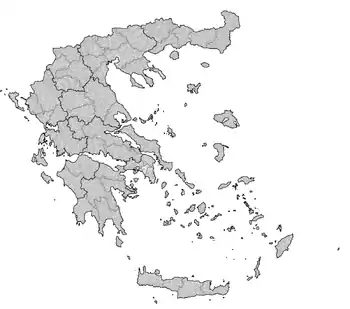Kapodistrias reform (Greek: Σχέδιο Καποδίστριας, "Kapodistrias Plan") is the common name of law 2539 of Greece, which reorganised the country's administrative divisions. The law, named after 19th-century Greek statesman Ioannis Kapodistrias, passed the Hellenic Parliament in 1997, and was implemented in 1998.[1] The administrative system was changed again at the 2010 Kallikratis reform.[2]
Municipalities and communities

Before and after the Kapodistrias reform, the difference between municipalities (δήμοι) and communities (κοινότητες) was merely a matter of size. Municipalities were larger and had a more urban character than communities, which were as small as a single village. The reform reduced the number of municipalities and communities sharply: from 5775 (441 municipalities and 5382 communities) to 1033 (900 municipalities and 133 communities).[3]
Municipalities and communities varied in population from 745,514 (Athens) to 28 (Gramos, in Kastoria Prefecture) with an average of 10,603.5 and a median of only 4,661.5 (2001 census "real" population, including Agion Oros as one of the municipalities). The following table illustrates the range:
| Population | Number of municipalities and communities |
|---|---|
| Less than 1,000 | 88 |
| 1,001 to 5,000 | 458 |
| 5,001 to 10,000 | 260 |
| 10,001 to 50,000 | 184 |
| 50,001 to 100,000 | 36 |
| More than 100,000 | 8 |
Municipalities and communities varied in land area from 873.552 km2 (Kato Nevrokopi in Drama Prefecture) to 0.800 km2 (Nea Chalkidona in Athens Prefecture), with an average of 127.618 km2 and a median of 105.669 km2.
See also
References
- ↑ Kapodistrias program, Greece Ministry of the Interior
- ↑ "ΦΕΚ A 87/2010, Kallikratis reform law text" (in Greek). Government Gazette.
- ↑ Structure and Operation of Local and Regional Democracy, Greece, Athens, 2012
External links
- Law 2539, Government Gazette 244, 1997